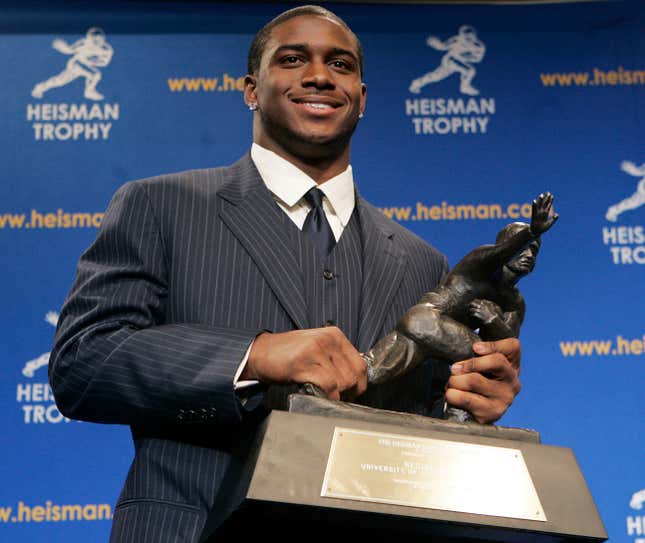
In 2005, Reggie Bush was about the closest thing to God in the flesh.
I’m not alone in that observation either, as evidenced by him being named the Associated Press College Football Player of the Year, a two-time consensus All-American, a two-time Pac-10 Offensive Player of the Year, and too many other awards and accolades to count. But it was his crowning achievement, winning the Heisman Trophy, that solidified his status as one of the greatest college football players of all time.
“It means everything for me,” the USC junior tailback said at the time. “Me and [USC quarterback] Matt [Leinart] just made history. We won it back-to-back. For my family, for my hometown of San Diego—it’s a great opportunity, a great feeling.”
That “great feeling” would soon be snatched away after an NCAA investigation determined that he received improper benefits while playing for the Trojans. In turn, USC’s football program was slapped with severe sanctions and was forced to vacate every game that Bush played while he was ineligible—including their 2005 national title—and dissociate entirely with the now 36-year-old, who would go on to enjoy a fruitful career in the NFL.
In the years since, Bush proved himself to be a productive running back during his 11-year stint in the big leagues, but the shame of his purported transgressions always loomed overhead. But now that we live in a world in which NCAA athletes are no longer forbidden from monetizing their name, image, or likeness—Tennessee State phenom Hercy Miller has already secured a $2 million deal with an unnamed “American technology company” after the new rules went into effect on Thursday—the 2019 New Orleans Saints Hall of Fame inductee not only wants his records as a member of the USC Trojans reinstated but his Heisman Trophy back.
“Over the last few months, on multiple occasions, my team and I have reached out to both the NCAA and The Heisman Trust in regard to the reinstatement of my college records and return of my Heisman,” Bush said in the statement. “We left multiple messages for Michael Comerford, the President of the Heisman Trust, but instead received a call from Rob Whalen, the Executive Director, who stated that Mr. Comerford would not be calling us back and that, in any event, they could help us. We reached out to the NCAA on multiple occasions and received no help or got no response at all. It is my strong belief that I won the Heisman trophy ‘solely’ due to my hard work and dedication on the football field and it is also my firm belief that my records should be reinstated.”
He’s 100 percent correct. Shoutout to the Supreme Court for facilitating the means to allow student-athletes to finally rid themselves of an oppressive amateur status that’s “flatly illegal in almost any other industry in America.” But if the NCAA is intent on righting its previous wrongs, aside from finally sharing the billions of dollars of revenue that players generate annually, it should absolutely restore Bush’s records and accolades, especially since any monetary gain he would’ve benefited from came from an outside source—sports agent Lloyd Lake and his partner Michael Michaels—with no relationship to the school.
It’s also important to note that had collegiate athletes been allowed to monetize their NIL back in 2005 like they are now, players like Tim Tebow, Zion Williamson, and Bush could’ve been pulling in the type of paychecks that would put some of Hollywood’s elite to shame.
But while we’re on the subject, the elephant in the room is Michigan’s fabled Fab Five, which was composed of NBA greats Chris Webber and Jalen Rose, current Michigan basketball head coach Juwan Howard, Jimmy King, and Ray Jackson. Not only did they set trends and help revolutionize college basketball but in boasting one of the strongest recruiting classes in the history of the sport, they also hold the unique distinction of being the first team in NCAA history to play for a national championship with a starting lineup of nothing but freshman.
Sadly, while their impact on the game remains intact, their records do not. Because in 2002, Michigan was forced to vacate its loss in the 1992 Men’s Basketball Tournament, forfeit the entire 1992-93 season, get rid of its Final Four banners from its 1992 and 1993 seasons, and remove Webber’s contributions from the history books. So if the NCAA truly aspires to atone for its sins of the past, the Fab Five need in on some of that reinstatement action, too.
“Hey NCAA: since you have now admitted that college athletes are professional, how about righting past wrongs and reinstating the records of Reggie Bush, the Fab Five, and countless others you mistreated over the phony concept of amateurism?” ESPN analyst Jay Bilas tweeted on Wednesday. “It was unfair then, and clearly so now.”
I couldn’t agree more.
The ball’s in your court, NCAA. Set an example for student-athletes of the future by doing right by the ones that made you what you are today.

